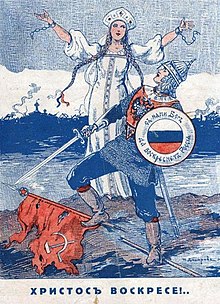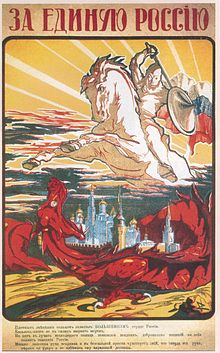White movement
![]()
This article or subsequent section is not sufficiently supported by evidence (e.g., anecdotal evidence). Information without sufficient evidence may be removed in the near future. Please help Wikipedia by researching the information and adding good supporting evidence.
White Movement (Russian Бе́лое движе́ние, also Белое дело "White Cause" or Белая идея "White Idea") was a military-political current of various forces and groupings formed in the course of the Russian Civil War from 1919 until their annihilation in 1922 against the Bolsheviks and the young Soviet power. Colloquially, they were usually referred to simply as the Whites.
The armed arm of the White Movement was the White Army, whose nucleus was the so-called Volunteer Army.
During its existence, the White Army committed numerous pogroms, especially against the Ukrainian-Jewish civilian population, in which about 60,000 people died. The background to this was the anti-Semitism that had been widespread in Russia for centuries and the pejorative, sweeping equation of Jews with Communists and Jewish culture with the ideas of Communism (cf. "Jewish Bolshevism") (→ White Terror).
Monarchists who wanted to re-establish the tsardom, but also moderate socialists and republicans who were against any Bolshevik ideas were united under the name of the Whites. They were all united as the principle of their actions: "Russia - united, powerful and indivisible". A claim that was later largely realized by the Red Army.
The White Movement was de facto the strongest anti-Bolshevik military-political force during the Civil War period in Russia. This was based on monarchist, nationalist and far from democratic interests, plus separatist aspirations in Ukraine, the North Caucasus and Central Asia.
After the successful October Revolution, the Whites, who were already forming against the revolution at the end of the First World War, were supported by troop invasions of the Entente and its allies until around 1922 in order to preserve or expand the sphere of influence of Western European states. More important to the civil war effort, however, were the massive supplies and aid provided to White troops in Siberia and southern Russia. For example, Winston Churchill wrote in a memorandum of September 15, 1919, that in 1919 England had spent the enormous sum of 100 million pounds and France between 30 and 40 million pounds on White troops in Russia.
→ See also: Intervention by the Entente Powers
The term White Movement was born in Soviet Russia and was based on the white uniforms of officers or cadets. It spread to the Turkic peoples of the Russian Empire in the 1920s.

Front page of the anti-Soviet exile magazine Chasovoy (The Sentry), Paris, ca. 1932

For a united Russia , poster 1919
Search within the encyclopedia